Djursholm | |
|---|---|
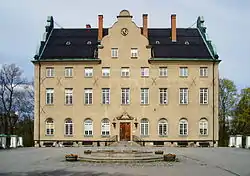 | |
 Coat of arms | |
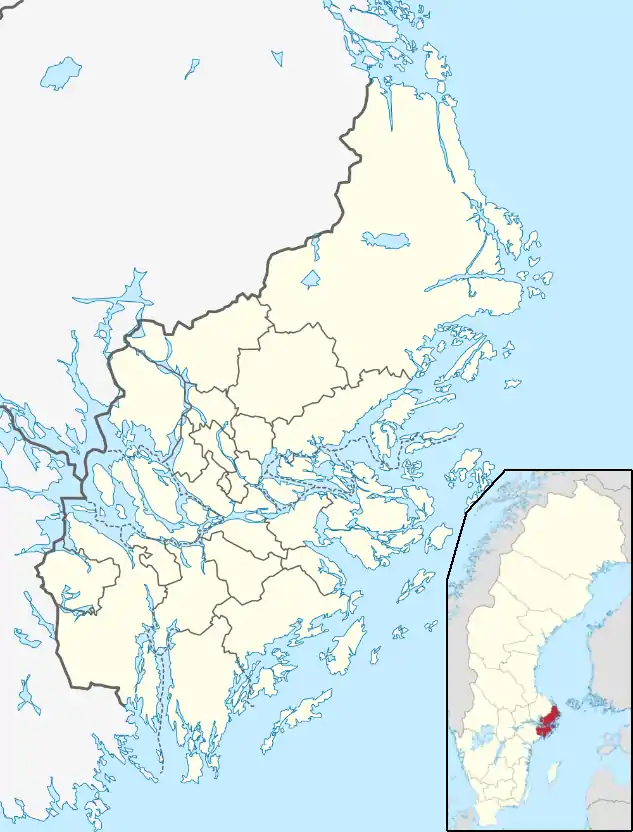 Djursholm 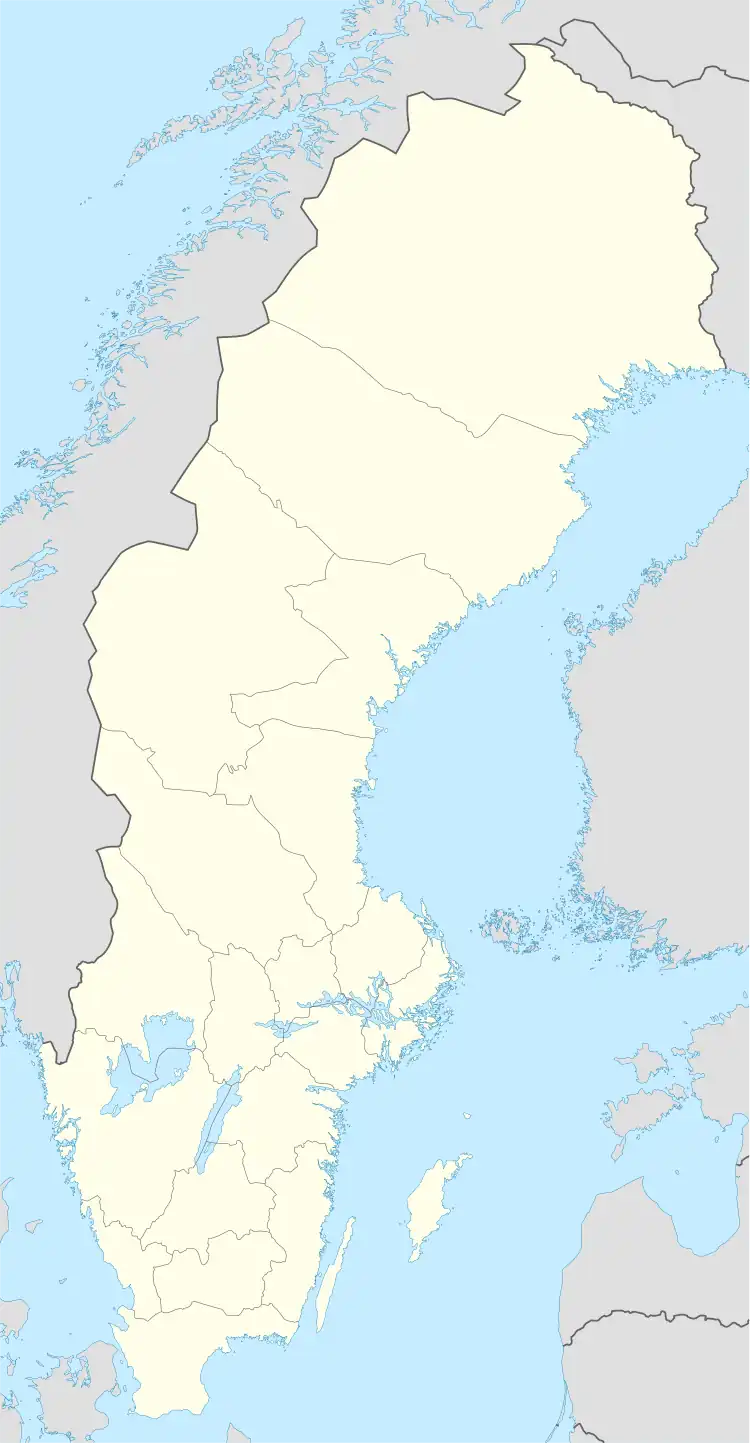 Djursholm | |
| Coordinates: 59°23′50″N 18°05′15″E / 59.39722°N 18.08750°E | |
| Country | |
| Municipality | Danderyd Municipality |
| County | Stockholm County |
| Province | Uppland |
| Charter | 1901 |
| Time zone | UTC+1 (CET) |
| • Summer (DST) | UTC+2 (CEST) |
Djursholm (Swedish pronunciation: [jʉːʂˈhɔlm]) is one of four suburban districts in, and the seat of Danderyd Municipality, Stockholm County, Sweden. Djursholm is included in the multi-municipal Stockholm urban area. Djursholm is divided into a number of different areas: Djursholms Ekeby (northwest), Svalnäs (northeast), Ösby (central), Berga (southwest) and Gamla Djursholm ('Old Djursholm', southeast). It is also partly located in Täby Municipality.
History
Djursholm was one of the first suburban communities in Sweden, its history as such beginning in 1889 with the founding of Djursholm AB (Djursholm Inc.) by Henrik Palme and the subsequent 1890 inauguration of the railway line connecting Djursholm to Stockholm, Djursholmsbanan. Since 1895 it has been served by electric suburban trains but the original branch was closed in 1975.
Djursholm is the wealthiest community in Sweden, with the most expensive property prices in the country.[1] It was built as a garden city with large villas, most from the turn of the century, along winding roads. From the start, the elegant seaside quarters attracted many well known academics, cultural personalities and industrialists.
Djursholm was separated from Danderyd as a municipality of its own in 1901, becoming a city (Djursholms stad) in 1914. In 1971 it was reunited with Danderyd when the present municipality was created. Statistically Djursholm lies within the Stockholm urban area.
Sights
- Djursholm Castle. The original stone building was likely erected by Nils Eskilsson Banér in the 15th century. Svante Gustavsson Banér commissioned a refurbishment of the castle to its current form in the 16th century
- Djursholm Chapel. Completed in 1902 on the initiative of Fredrik Lilljekvist, who was also the architect. The ornate altar paintings are by Natanael Beskow, who was the resident vicar at the time.
- Villa Pauli. Large villa on Strandvägen in central Djursholm, designed by Ragnar Östberg and completed in 1907. Since 1986, Villa Pauli has been a private club with a gourmet restaurant, banquet room and hotel.
- Germania beach. Sandy beach that has become a popular destination for people from Djursholm and surrounding areas. Situated at the end of Strandvägen and Germaniavägen, two of the central roads of Djursholm.
Gallery
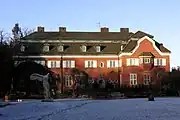
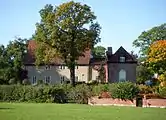 Villa Lagerkrantz (Elis Benckert)
Villa Lagerkrantz (Elis Benckert)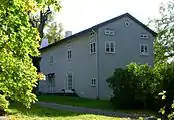 Villa Snellman (Gunnar Asplund)
Villa Snellman (Gunnar Asplund)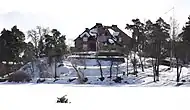 Gamla Djursholm (Carl Westman)
Gamla Djursholm (Carl Westman)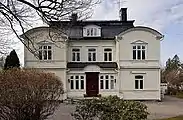 Prinsvillan (Gustaf Hermansson)
Prinsvillan (Gustaf Hermansson)
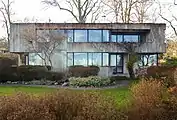 Villa Dehlin (Léonie Geisendorf)
Villa Dehlin (Léonie Geisendorf)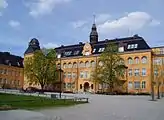 Viktor Rydbergs samskola (Georg A. Nilsson)
Viktor Rydbergs samskola (Georg A. Nilsson)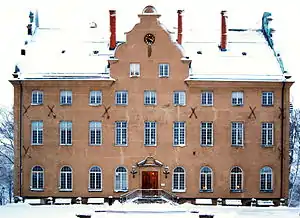
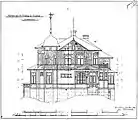 Villa Lorride (Ernst Lundroth)
Villa Lorride (Ernst Lundroth)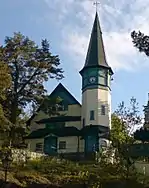 Djursholm Chapel (Fredrik Lilljekvist)
Djursholm Chapel (Fredrik Lilljekvist)
Notable inhabitants
- Alice Tegnér, artist
- Annika Falkengren, industrialist
- Annika Linde, state epidemiologist
- Bertil Hult, industrialist
- Björn Ulvaeus, musician (ABBA)[2]
- Charlotte Perrelli, singer
- Elizabeth Hesselblad, saint
- Elsa Beskow, artist and author
- Prince Erik, Duke of Västmanland
- Fredrik Lundberg, industrialist
- Gösta Mittag-Leffler, mathematician
- Hannes Alfvén, nobel laureate in physics
- Ingvar Kjellson, actor
- Jacob Wallenberg, industrialist
- Jakob Lindberg, musician
- Jan Carlzon, industrialist
- Jenny Syquia, model and designer
- Johan Banér, fieldmarshall
- Magnus Uggla, singer and songwriter
- Marie Fredriksson, musician (Roxette)
- Natanael Beskow, preacher, author, artist
- Robert Thegerström, artist
- Robin Söderling, former professional tennis player
- Stefan Persson, industrialist
- Tove Lo, singer and songwriter
- Verner von Heidenstam, author
- Viktor Rydberg, author
References
External links
- History of Djursholm (in Swedish) – at Stockholm University